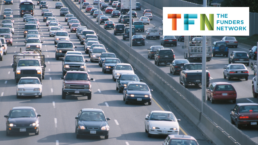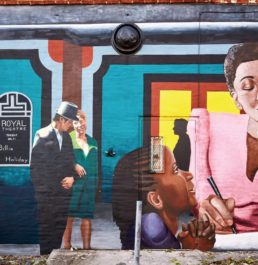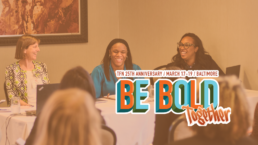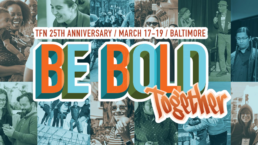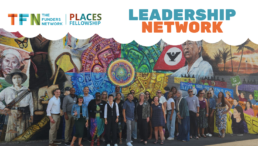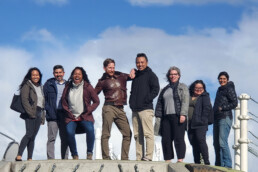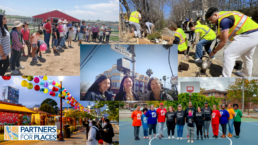TFN @ the Movies — Razing Liberty Square
Are you joining us in Baltimore for TFN's 25th Anniversary Conference: Be Bold Together? Be sure to join us Sunday at 6 p.m. for TFN @ the Movies as we present a timely, thought-provoking documentary as well as a Q&A with those involved in the making of the film.
We're thrilled to share this year's selection: Razing Liberty Square, an award-winning documentary about a community in the crosshairs of climate gentrification — and those fighting to save it from being erased in a rapidly changing Miami. Watch the trailer here.
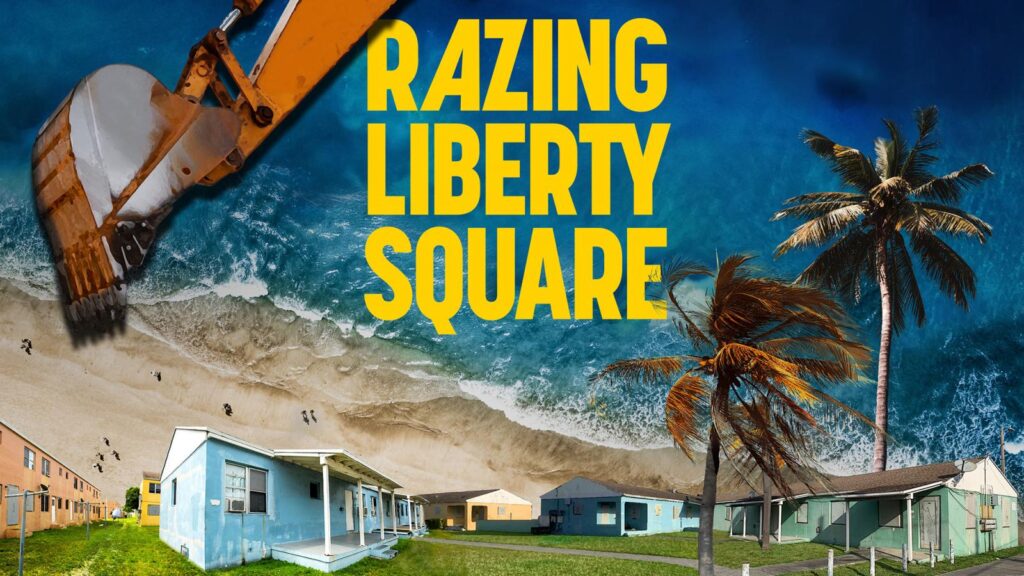
Razing Liberty Square is set in the oldest segregated public housing project in the South: Liberty Square, at the heart of Miami’s Liberty City.
Underserved for decades and suffering from chronic disinvestment, Liberty City has one of the highest poverty rates in the nation.
But as rising seas threaten Miami’s luxurious beachfront, wealthy property owners are pushing inland to higher ground. Liberty City, which sits on a ridge, is now real estate gold.
When residents of Liberty Square learn about a $300 million revitalization plan for their neighborhood, they know that this sudden interest comes from the fact that their neighborhood is located on the highest-and-driest ground in the city.
Now they must prepare to fight a new form of racial injustice: climate gentrification.
We'll be joined by filmmaker Katja Esson, community leader Valencia Gunder and climate action advocate Caroline Lewis for a panel discussion moderated by TFN's Tere Figueras Negrete.
TFN @ the Movies is presented with the support of the Wyncote Foundation.
ABOUT OUR SPEAKERS

KATJA ESSON
Film Director
Born in Germany and based in Miami, Katja Esson is an Academy Award-nominated filmmaker whose documentaries tackle race, class, and gender. She is a member of the Academy of Motion Picture Arts and Sciences.

VALENCIA GUNDER
Founder and Co-Director
The Smile Trust
Valencia provides coordination and support for diverse, low-wealth communities addressing climate change impacts. She is co-director of the Smile Trust and executive director of the Black Collective and the Freedom Lab. Valencia also founded the Community Emergency Operations Center in Liberty City in the wake of 2018's Hurricane Irma.

CAROLINE LEWIS
Founder & Senior Advisor
The CLEO Institute
Caroline, an education and engagement strategist, founded The CLEO Institute in 2010. The Florida-based nonpartisan organization is dedicated to climate education, advocacy, and engagement.

TERE FIGUERAS NEGRETE
Senior Communications Director
The Funders Network
Tere has been part of TFN's leadership team since 2016. Before joining TFN, she spent 15 years as an award-winning writer and editor with the Miami Herald.
ABOUT TFN25
Join us March 17-19 for TFN's 25th Anniversary Conference: Be Bold Together in Baltimore. We'll gather at the Renaissance Baltimore Harborplace Hotel, located on the Inner Harbor, the city's historic seaport.
TFN25 offers skill-building workshops, deep-dive strategy sessions and opportunities to forge new connections and expand your professional networks.
We hope you'll join us for the Post-conference Inclusive Economies and Urban Water Funders Meeting: Leveraging Public Infrastructure Funds from 1 to 3 p.m. Wednesday, March 19, immediately following our Closing Plenary and lunch.
➡️Check out our TFN25 Anniversary Conference website to view our Learning Agenda and more.
The Road Less Funded: Philanthropy's Role in Transportation Funding
BY Lisa Jacobson, Barr Foundation and Elizabeth Love, Jacob and Terese Hershey Foundation
Pop quiz: What sector contributes roughly 33% of greenhouse gas emissions, but receives just 5% of climate funding?
Here’s a hint: It’s complex. It’s long term. It’s political. It’s rooted in racism. And it’s critical to address it head-on if we are committed to our climate goals.
It’s... transportation!
A recent (and quite illuminating) ClimateWorks report shows that of the $16 billion of philanthropic dollars invested in climate globally, $660 million (or about 4%) went to transportation electrification. If we also add in about a third of the ‘Cities’ investment (assuming that urban mobility work is about a third of $440 million), we estimate that transportation receives about 5% of climate funding.
If transportation is so critical to tackle to address climate, why aren’t we putting more dollars towards it? Where are the climate funders ready to meaningfully curb our transportation emissions?
Transportation touches everyone’s lives every day. The transportation options available to you affect your time, your safety, your ability to get a job and get to it, your health and your kids’ ability to get around. Changing the system is tricky work. With billions of public dollars at play, complex bureaucracies and often opaque decision-making — the acronyms alone are enough to befuddle.
Enter: The Mobility and Access Collaborative, a network of place-based and national funders focused on ensuring that people have access to reliable and affordable public transportation, safe and connected places to bike and walk, better air quality and land uses that enable people to get what they need without hopping in a car. Affectionately known as the MAC, we do not envision a future society filled with electric vehicles, but one that has options — clean vehicles AND more affordable and convenient travel choices.
We believe that if America is going to be a place of freedom for all, owning and driving a car should not be the only ticket to a well-paid job or affordable place to live. A Union of Concerned Scientists report demonstrated that a ‘more complete set of transportation options is a more effective climate solution than maintaining a car-dependent transportation system’.
So, what are we doing about it?
The MAC has several projects in the works:
- Advocacy Spotlight — Are you supporting incredible transportation organizing and advocacy that you want to bring visibility to? We invite funders to lift up the great work of advocates they are funding. Learn more and nominate a group here. Look to be inspired by these stories on LinkedIn.
- Broadening our funding levers — The MAC is launching a scan to help funders sharpen the tool of litigation in the systems change toolbox. We will explore the landscape from fighting freeway widenings through black and brown communities to state constitutional challenges, tort cases on dangerous designs and countering federal actions. Learning together and sharing what’s worked (and hasn’t) helps us be more effective and strategic funders.
- Planning for federal funds — Despite the changes at the federal level, the bread-and-butter money for transportation will need to be reauthorized by Congress in the coming years, and it’s complicated. Let’s learn together with Transportation for America to level-set on the history of transportation funding as background for the coming reauthorization. Watch for it later this spring on TFN’s LinkedIn page or sign up for the MAC email list.
- Transportation and its many intersections (pun intended) — So you don’t fund transportation, but you know it connects with your issue areas? Let’s talk. By way of example, the MAC and TFN’s Urban Water Funders are exploring synergies between these two major systems essential to every community. In these times, it is more critical than ever to work together.
Intrigued? Now what?
The MAC welcomes more involvement, even if transportation is only a small part of your portfolio:
- Plan to join us for a joint happy hour with Urban Water Funders in Baltimore on March 17 at the TFN 25th Anniversary Conference.
- Sign up for the MAC email list for updates and invitations.
- Reach out to MAC coordinator Martha Roskowski at martha@fundersnetwork.org for more info on any of the projects or to learn more about joining the MAC team.
About the Authors
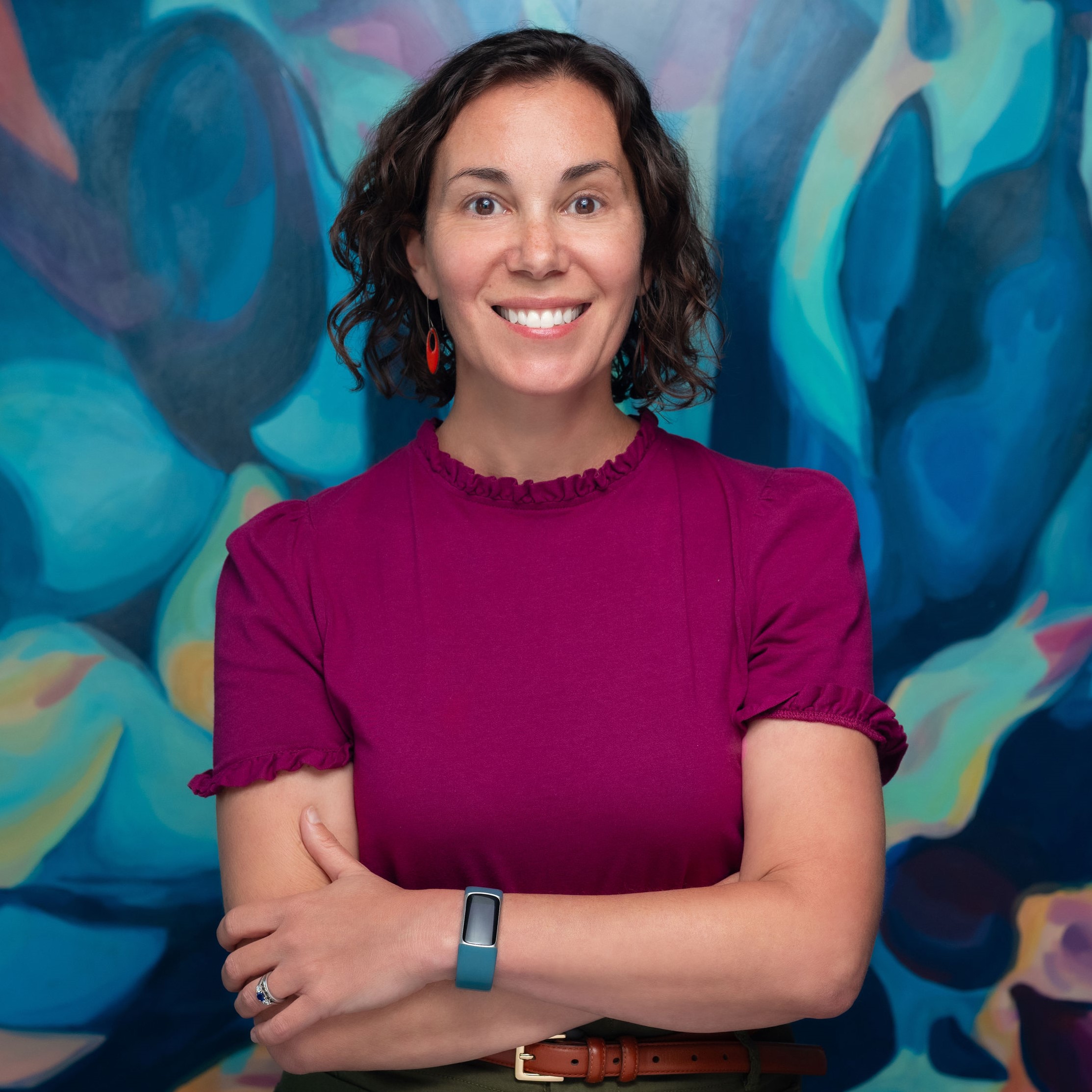
Lisa Jacobson is a Senior Program Officer at the Barr Foundation. She leads the Mobility strategy on the Climate team and collaborates on projects and grantmaking that support people accessing what they need in low-carbon ways. Lisa currently serves on the board of The Funders Network and is a proud TFN PLACES Fellow alum. She co-chairs the Mobility and Access Collaborative with Elizabeth Love.
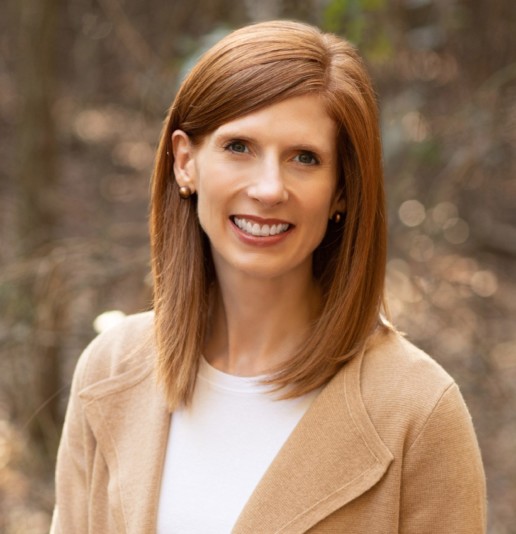
Elizabeth Love is CEO of the Jacob and Terese Hershey Foundation, which supports those working boldly toward a healthy environment, reproductive justice and the nurture of nature. Elizabeth currently serves on the board of The Funders Network, and co-chairs the Mobility and Access Collaborative with Lisa Jacobson.
Discover Baltimore's Community-driven Initiatives with TFN25 Mobile Workshops!
We hope you'll join us for TFN's 25th Anniversary Conference, where our equity-focused learning agenda will center those most harmed by the intersecting impacts of environmental, economic and social injustice.
And get ready to leave the confines of the conference room on one of our Mobile Workshops! Discover Baltimore's resilient grassroots movements and community-driven initiatives that have emerged in response to systemic issues.
Choose from one of our five Mobile Workshops to learn from and connect with the changemakers, movement leaders and funder partners driving meaningful impact in neighborhoods across Baltimore.
Mobile Workshops will take place March 18 from 11 a.m. - 4 p.m. Please make sure to wear comfortable shoes. Lunch will be provided. Space is limited for our Mobile Workshops. Attendees can reserve their spot via our Swapcard conference app.
Anchors of Change: How HBCUs are Driving Community Transformation
This workshop will explore the role of Historically Black Colleges and Universities (HBCUs) in Baltimore’s neighborhood revitalization efforts. Rooted in their communities, these institutions serve as anchors — mobilizing resources, fostering partnerships and generating shared outcomes for sustainable local impact.
Drawing from ANCHORED IN PLACE by The Funders Network, this workshop will specifically examine how Coppin State University is addressing community needs.

Pedals, Paths, Buses, and Tracks: Linking Communities Through Mobility
This workshop explores Baltimore’s transportation challenges and solutions, focusing on cycle tracks, and regional and federal transit initiatives. It will highlight the importance of improving connectivity in historically disconnected communities by reshaping traffic patterns and creating pathways for both pedestrians and cyclists.
Participants will examine economic and community development at the nexus of land use and transportation. The workshop will conclude with a group e-bike ride.

Resilience in Action: How Baltimore is Responding to Climate Change
This workshop explores how the city is advancing climate resilience and environmental justice through innovative solutions that prioritize sustainability, equity and community engagement. This workshop highlights key initiatives aimed at building climate resilience in Baltimore’s neighborhoods, with a focus on community-centered partnerships and systems change.
Cultural Renaissance: Art, Entrepreneurship and Renewal in Baltimore
This mobile workshop will explore the intersection of art, entrepreneurship and community economic development in Baltimore, visiting cultural and creative spaces that are driving social change and economic opportunity. Participants will engage with local artists, entrepreneurs and community leaders to learn how art is being used as a tool for economic development, community building and historic preservation.

Building Baltimore’s Future: Equitable Redevelopment and Community Impact
This mobile workshop will immerse participants in Baltimore’s dynamic neighborhood redevelopment, focusing on the intersection of community empowerment and equitable growth. Through site visits and interactions with local leaders, participants will explore how urban revitalization efforts — spanning education, community engagement and business development — are shaping the city's future.
The workshop offers valuable insights into fostering inclusive, sustainable transformation, with a particular emphasis on how targeted redevelopment can create opportunities for historically underserved communities. This experience will equip funders with the knowledge to support projects that balance growth with social equity.
➡️Check out our TFN25 Anniversary Conference website to view our Learning Agenda, Accessibility and Wellbeing policies, Childcare options and more.
Exploring Regional Partnerships, Resilience Investments and more at TFN25's Concurrent Sessions
Are you curious about the powerful and creative philanthropic work making a real impact on people, places and policies? Are you looking for frank conversations about the challenges we face in the philanthropic sector?
Join us for TFN’s 25th Anniversary Conference on March 17-19 in Baltimore as we learn, share and spark joy together.
Concurrent Sessions will take place Wednesday, March 19 at 2 - 3:45 p.m. Read on to learn about our thought-provoking Concurrent Sessions or click here to view the full TFN25 agenda.
Concurrent Sessions
Regional Partnerships to Advance Local Solutions and Resilience
Partnerships of all kinds, especially regional partnerships, have important roles to play in advancing housing, economic mobility and environmental justice.
In this session, with the water sector serving as a learning lab for other fields, we will explore three models of regional partnerships that are enabling more robust, dynamic and equitable solutions to municipal challenges. We will also investigate the role that philanthropy can play in advancing these partnerships.
Featured Speakers:
- Mami Hara (US Water Alliance)
- Alaina Harkness (Current Water)
- Kishia Powell (WSSC Water)
- Megan Zeigler (Southwestern Pennsylvania Municipal Project Hub).
This is What Democracy Looks Like: Building Power by Building Better
As transportation fuels rising sea levels and greenhouse gases, inaction means we will fail to meet our climate goals, prepare for a changing world and protect people from dire health consequences.
Join us to learn from advocates about how they’re leveraging power-building in frontline communities, developing policies that will impact virtually all of our infrastructure decisions, and directing and braiding federal funds toward climate and equity outcomes. We'll also unpack the racial and economic justice ramifications of their work.
Featured Speakers:
- Terrance Bankston (Friends of the Earth)
- Vee Paykar (Zero Now Fund)
- Renae Reynolds (Tri-State Transportation Campaign)
- Nick Sifuentes (The Summit Foundation)
Building Power For Environmental Justice in Challenging Political Climates
How can place-based grantmaking strategies help communities on the frontlines of climate change build power and lead the charge for a just transition?
Join this session to learn strategies that groups in the heart of the fossil fuel industry, despite challenging political contexts, are using to build power for environmental justice communities and working-class people of color. We'll also gain a better understanding of the types of climate finance infrastructure that can generate financial tools needed to build economic power and drive investment in historically disinvested communities.
Featured Speakers:
- Vanessa Toro Barragan (Hive Fund)
- Billy Briscoe (Clean Energy Fund of Texas)
- Claudia Magana (Organized Power in Numbers)
- Frances Valdez (Houston in Action)
Making The Green Transition Matter for Working People
The Southwest is seeing a boom in clean energy development that will exponentially grow over the next decade, driven in large part by the infusion of federal infrastructure investments since 2021.
In this session, hear from community, worker power and climate organizations that are leveraging the influx of federal dollars to ensure that positive impacts are widely felt by those most affected by the racial, environmental and economic inequities in the heart of the fossil fuel industry.
Featured Speakers:
- Cecilia Behgam (Texas Climate Jobs Project)
- Rosemarie Molina (Organized Power in Numbers)
- Vianey Olivarria (League of Conservation Voters)
- Amy Vruno (Invest in Our Future)
Resilience Investments: How Multi-Sector Collaboration Can Help Tap Federal Funding
Federal grant programs supporting resilient infrastructure and decarbonization present rare opportunities for communities that are most vulnerable to climate change. But the places that most need resilience investments often lack the capacity to secure them.
This session will focus on programmatic and policy efforts of two foundations, in the Northeast and the South, to maximize the likelihood of their regions attaining federal funding. Join us for a discussion between a public sector representative, a community-based organization leader and a place-based foundation sustainability program director, who will focus on recent efforts to increase multi-sector collaboration to develop competitive federal funding applications.
Featured Speakers:
- Isabel Barrios (Greater New Orleans Foundation)
- Rashida Ferdinand (Sankofa Community Development Corporation)
- Andrew McElwaine (The Heinz Endowments)
Reclaiming Identity, Fighting Health Inequity: How BIPOC youth are changing narratives and advancing health and social justice
The stark health inequities faced by Black, Indigenous and other people of color not only impact an individual's physical wellbeing but also deny, disregard and acontextualize identity and community — especially for young people.
Trauma-informed programs and storytelling initiatives that center the experiences and needs of BIPOC youth can help reclaim and affirm their sense of identity and build community power to address the dominant cultural conditioning of health and inequity. This immersive experience will highlight The Kresge Foundation’s community safety and health partners in New Orleans, Detroit, Memphis, Fresno and the San Francisco Bay area. We'll hear from funders and BIPOC youth-centered organizations with unique approaches to serving their communities.
Featured Speakers:
- Erica Browne (The Kresge Foundation)
- Kanwarpal Dhaliwal (RYSE Center)
- Tanyanika Franklin (Daughters Beyond Incarceration)
- Reign LaCour (Daughters Beyond Incarceration)
➡️Check out our TFN25 Anniversary Conference website to view our Learning Agenda, Accessibility and Wellbeing policies and more.
Interactive Skill-Building Workshops at TFN25!
We hope you'll join us for TFN’s 25th Anniversary Conference in Baltimore from March 17-19! Our TFN25 theme — Be Bold Together — reflects our belief that philanthropic leaders must boldly take courageous action, especially in these uncertain times.
The road ahead is long, and demands that we harness the skills, resources and collective strength needed to meet the challenge. Our Skill-Building Workshops offer the opportunity for active learning and exploration about key topics that will help funders become more equitable, effective and empathetic to the communities they serve and the grantmakers they support.
Skill-Building workshops are 135 minute, interactive sessions held March 17 from 9:45 a.m. - 12 p.m.

Skill-Building Workshops at TFN25
Myth-busting Nonprofit Finance: Bridging Numbers and Impact for Equitable Grantmaking
It’s not only who we fund, but how we fund that matters.
Step into an immersive learning experience featuring Nonprofit Finance Funds’ Full Cost Game. As funders, you'll embark on a journey through the complex, inequitable nonprofit landscape — navigating hurdles and celebrating victories.
You In? Creating Champions for Equitable Listening
In the last 10 years, we’ve seen rapid growth in the number of funders championing high-quality, equitable feedback and listening. But we’re still in the minority across philanthropy as a whole.
In this highly interactive session, you’ll hear stories from funders about how they’re building that buy-in, plus share tools and develop strategies for our specific focus areas and contexts.
Burnout, Boundaries and Compassion Fatigue: Healing Practices for Compassionate Leaders in Philanthropy
How can funders build compassionate, balanced and sustainable work practices?
This interactive session adopts a healing-centered and equity-based approach to support philanthropy practitioners advance these essential goals — including identifying burnout, setting boundaries and addressing compassion fatigue.
By the end, you will be equipped with best practices in grounding techniques, confident decision-making, and trauma-informed leadership rooted in community care.
Unlocking Community Power Through Cooperative Development
Funding for enterprise development often centers around “the what” and "the who": products and services those businesses are providing and which communities are given the opportunity to start and be employed by those businesses. This session will look at "the how.”
We'll examine models that cooperatively share ownership and governance responsibility with workers and communities. We will learn from cooperative development leaders and funders that support them about how cooperatives advance broader community goals, from supporting returning citizens to reindustrializing former manufacturing communities.
Advancing an Equitable Infrastructure Workforce: Core Competencies for Funders
With tens of thousands of new jobs being created as a result of federal investments, funders across our network have been eager to better understand and invest in equitable workforce development.
This session, hosted by TFN’s peer-led working groups, will dive into the core competencies for funders stepping into this space and deepen skills for those already investing.
Effective Narratives In an Era of Mistrust
As political polarization increases and divergent views on “facts” and “truth” threaten democracy, the ability to effectively communicate is more crucial than ever. This session will explore how narratives take shape — and what the research says about why people process information in different ways.
About TFN's 25th Anniversary Conference
Join us March 17-19 at the Renaissance Baltimore Harborplace Hotel as we learn, share and strategize. TFN25 offers skill-building workshops, deep-dive strategy sessions and opportunities to forge new connections and expand your professional networks.
Are you able to arrive early and/or stay late? Don’t miss out on our pre-conference events on Sunday, March 16! We’ll offer a Pre-Conference Learning Lab: Racial Equity in Practice and our popular TFN @ the Movies.
And we hope you'll join us for the Post-conference Inclusive Economies Meeting: Leveraging Federal Funds from 1 to 4 p.m. Wednesday, March 19, immediately following our Closing Plenary and lunch.
➡️Check out our TFN25 Anniversary Conference website to view our Learning Agenda, Accessibility and Wellbeing policies, and more!
Introducing the PLACES Leadership Network!
We are excited to announce the launch of the PLACES Leadership Network, a new organized community created by and for PLACES Alums!
With the purpose of mobilizing the PLACES Alum Network to make equitable change in the philanthropic and social impact sectors, the PLACES Leadership Network will operate through collective care, community learning and resource sharing, ensuring the sustainability of the PLACES Fellowship and the alum community.
The Leadership Network is a restructuring of the PLACES Advisory Board and aims to honor and build upon their valuable accomplishments.
Leadership Network members will engage in task forces that will co-create efforts to advance our community’s learning and skills, build our collective leadership and influence, sustain our beautiful PLACES community, and organize the Places Alum Network into action.
Sign up to join as a member if you’re looking to:
- Build community with your fellow alums and expand your network
- Strengthen your leadership skills and influence
- Design alum offerings for our collective benefit
- Obtain peer-support to sustain you in the work to make change
As a member you’ll have the opportunity to contribute your perspectives, resources, skills and expertise to the PLACES program and alum community, and advance equity and justice at the intersection of race, ethnicity, gender, ability, sexuality, class and all other identities that have been systematically marginalized.
Task Forces currently include:
- Community learning and skill building:
- Creating opportunities to solidify our racial equity and community organizing education and share the abundance of our collective knowledge.
- Building skills, resourcing opportunities and offering mentorship to strengthen our individual and collective leadership, and ability to bring about material change.
- Collective care and community wellness:
- Creating beautiful and accessible spaces to care for our community, ensure our well-being and honor our joy, love and grief to sustain us in the work.
- Designing ways to bring our community together to create an engaged and responsive network of peer-support and nurture our shared purposes.
Read our member description document to learn more about member responsibilities and commitment. Our first PLACES Leadership Network meeting will be on Feb, 20 so be sure to sign up by Feb. 1!
Reach out to Talissa Lahaliyed at talissa@fundersnetwork.org with any questions or to schedule a meeting with her to learn more.
PLACES 2025 Fellowship Applications Now Open!
Apply Here!
Deadline to submit applications is Jan. 6, 2025

For 15 years, TFN’s PLACES Fellowship has given leaders in philanthropy the tools and understanding to embed the values of equity and justice in their work.
What does it mean to be a PLACES Fellow?
PLACES is an investment in your personal and professional leadership growth.
PLACES is an opportunity to expand your understanding of systemic racial, social, environmental and economic inequities and their impact on climate, culture and communities.
Participation in PLACES is a chance to forge connections with individuals who share your passion for creating positive change and driving meaningful impact through their grantmaking and community engagement practices.
A Transformative Journey
From small, rural organizations to regional grantmaking associations to large urban foundations and grantmaking intermediaries, PLACES Fellows hail from geographically and politically diverse communities across North America.
More than 200 PLACES Fellows have completed this transformative learning journey, representing a wide range of place-based grantmaking and lived and worked experiences.
They've cultivated strong bonds, developed individual and collective leadership skills, and have been introduced to diverse perspectives. And they have increased their understanding of the historic and systemic issues impacting communities today.
Increased Impact, Ongoing Support
Fellows also explore the role grantmakers can play in addressing community needs and supporting community building in an equitable way.
Their impact can be seen in work addressing a wide range of issues — such as the escalating climate crisis, a widening wealth gap, disaster response and recovery, the growing housing crisis, and the erosion of civil liberties.
TFN is committed to supporting Fellows in their efforts to embed equity into their grantmaking and community engagement practices. Our network will create continued learning opportunities for our PLACES Alums and their supporting organizations that will reinforce their efforts both during and beyond the fellowship.
PLACES not only benefits individual grantmakers but enriches their institutions and the field of philanthropy as a whole.
Apply now — or share this opportunity with someone who may be interested!

About the PLACES Fellowship
PLACES, which stands for Professionals Learning About Community, Equity and Sustainability, is an eight-month learning journey designed to help grantmakers embed the values and practices of environmental, economic and racial justice into their work.
Regardless of their grantmaking portfolios, PLACES Fellows are equipped with the tools needed to understand, challenge and change systemic inequities, and then translate that learning into meaningful action and impact.
Recent cohorts have addressed issues impacting disenfranchised communities, including structural racism, gender justice, health equity, environmental sustainability, economic development and community engagement — asking difficult questions and exploring uncomfortable truths along the way.
Apply for TFN’s 2025 PLACES Cohort if you are looking to:
- Expand your understanding of systemic racial, social and economic inequities and their impacts on policy, culture, communities and climate.
- Acquire the tools and resources to embed the values of equity and justice in your work as a grantmaker.
- Explore and challenge your own biases and blind spots, regardless of your background, about who you are and how you create change.
- Forge deep connections with other leaders in philanthropy who are deeply committed to shared learning and collaboration.
- Invest in your personal and professional leadership growth.
- Tap into the resources and opportunities as a member of the PLACES Alum Network, including alum-only learning sessions, networking events and digital platforms.
Expectations for Fellows and Supporting Organizations:
- TFN expects that, at the time of the first site visit, Fellows will have at least 12 months of philanthropic grantmaking experience.
- TFN expects that Fellows will attend all PLACES site visits, participate in group calls and coaching sessions, and highly consider the TFN Annual Conference and other learning opportunities offered by the network.
- TFN expects that the Fellow’s direct supervisor is committed to supporting the Fellow’s professional development and work in advancing more equitable practices within the supporting organization or grantmaking portfolio.
- TFN expects that once the PLACES Fellowship ends, Fellows will continue to stay engaged with PLACES or the larger TFN community through opportunities such as working groups, issue-based steering committees, learning calls, or PLACES Alum Network activities.
Key Dates & Fellowship Fees
Key Dates
Once selected, the PLACES Cohort will have a virtual orientation as well as four in-person site visits*:
- April 3: One-hour Virtual Orientation
- May 13-16: Tucson, Ariz.
- July 23-25: Saint Paul, Minn.
- Sept. 17-19: Nashville, Tenn.
- Nov. 12-14: Washington, D.C.
*Dates and Location subject to change
Fellowship Fees
TFN, through general operating support grants and membership dues, invests $20,000 per Fellow to support the Fellowship Cohort’s year-long learning experience. Participation fees help support the programmatic and operational costs associated with the PLACES Fellowship, including but not limited to coaching, training, speaker honoraria, facilitator fees, group meals and transportation.
TFN Members: $1,500
Non-members: $2,000
Fellows will be responsible for travel costs and hotel accommodation for site visits.
(Limited travel sponsorships will be available to offset travel costs and are subject to availability.)
PLACES Fellows will receive one complimentary registration for TFN’s annual conference following their graduation from the cohort.
Fellowship Feedback: What PLACES Alums Are Saying
→ Meet the 2024 PLACES Fellows
→ Read reflections and insights from Fellows in our Going PLACES blog series.
Some key findings from our evaluation survey shared by PLACES Alums:
- 81% reported increasing grants to organizations led by and serving people of color.
- 83% said PLACES help them better connect sustainability issues to racial justice.
- 86% of surveyed alums reported advocating for more equitable practices.
- 95% of surveyed alums said PLACES provided them with skills, tools, and resources to advance practices that promoted equity in their organization.
- 93% of surveyed alums said PLACES provided them with skills, tools, and resources to advance practices that promoted equity in their grantmaking.
- 92% of surveyed alums said PLACES helped them better understand the culture of white supremacy and how it shows up in philanthropy.
Questions? Email the PLACES team at places@fundersnetwork.org
New Grant Opportunities: The Latest Round of Partners for Places Is Now Open!
BY TFN Staff
The Funders Network (TFN), in partnership with the Urban Sustainability Directors Network (USDN), is thrilled to announce the opening of the latest round of the Partners for Places grant program.
The deadline to submit proposals is February 28, 2025.
The Partners for Places matching grant program supports equitable sustainability projects and helps build partnerships between local government leaders, frontline community groups and place-based funders in the U.S. and Canada.
Since 2012, Partners for Places has supported more than 200 projects in communities both large and small, spanning coast to coast and across geographically and politically diverse landscapes.
Partners for Places has awarded nearly $12 million for community-driven sustainability projects, leading to more than $23 million in investments.
By encouraging and cultivating partnerships at the local level, the grant program helps foster relationships that increase community engagement, bridge divides and make our communities more resilient, prosperous and equitable in the long-term.
Partners for Places is supported by national funders, whose investment in a place-based grant program promotes a healthy environment, a strong economy and well-being for all people.
In recent years, the grant program has adopted a strategy that leads with racial equity and a sharper focus on how best to advance equitable and sustainable practices in communities, especially those disproportionately vulnerable to climate impacts.
These matching awards provide partnership investments between $45,000 and $100,000 for one-year projects, or between $75,000 and $150,000 for two-year projects, with one or more local foundations required to provide at least a 50% matching grant.
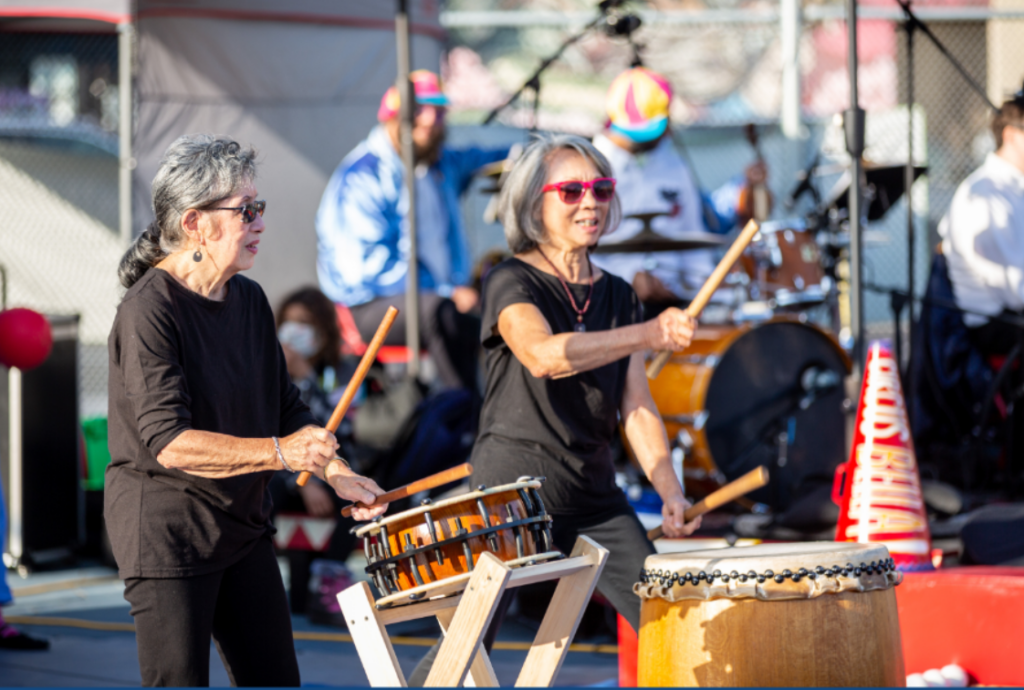 Oakland will use its Partners for Places funding to co-create a "Rooted and Resilient" plan for the city's Chinatown,
Oakland will use its Partners for Places funding to co-create a "Rooted and Resilient" plan for the city's Chinatown,
advancing community-led climate and resilience priorities. Photo credit: Jonathan Fong and Friends of Lincoln Square Park.
Grantee Coaching & Shared Learning
The grants also provide an opportunity for grantees to deepen their own knowledge and learn from other grantee communities working on Partners for Places projects.
In addition to equity-focused coaching for individual projects and a kick-off orientation for the grantee cohort, Partners for Places grantees also share project updates and challenges with each other during peer calls.
And lessons learned from completed projects are featured in the Partners for Places Idea Bank, offering additional opportunities to build on the collective wisdom of grantee communities.
Our grants team wants every submission to be as strong and successful as possible. To that end, technical assistance is available to those who are considering applying for a grant.
Prospective applicants are also encourages to take part in our Partners for Places Round 22 Informational Call on Jan. 22 at 3 p.m. ET.
How To Apply
Interested in applying? Access the application and resource documents below. (These resources are also available on our Partners for Places home page.)
Round 22 Application and Resources
- Invitation to Apply
- Application Form
- Budget Form
- General Selection Criteria
- Informational Webinar: Jan. 22 at 3 p.m. ET | Register here.
The application deadline for Round 22 is Feb. 28 (by 11:59 p.m., any time zone).
Round 22 general Grant funds will support:
- Spreading of local Equitable Climate Action (ECA) and/or Green Stormwater Infrastructure (GSI) practices.
- Advancing opportunities for local government, frontline communities, and place-based funders to build trust and develop projects together.
Please visit the Partners for Places webpage for more information.
About Partners for Places
Partners for Places is led by TFN in partnership with the USDN.
The matching grant program brings national funder investors together with place-based funders to support equitable and sustainable climate action and green stormwater infrastructure projects. The program is currently supported by four investor foundations: The JPB Foundation, The Kendeda Fund, The Kresge Foundation and the Pisces Foundation.
→ Read about the latest round of Partners for Places matching grant recipients here.
→ Read about previous rounds of grants in the Meet the Grantees section of the Partners for Places webpage.
Additional Resources & FAQ's
→ Register for our Round 22 Informational Webinar designed to help potential applicants prepare proposals, Jan. 22 at 3 p.m. ET. Register here.
→ Read this feature story about Partners for Places in Inside Philanthropy here.
→ Where is Partners for Places making an impact?
Read previous grant announcements and explore the Partners for Places Grantee Map here.
→ Where can I learn about completed Partners for Places projects?
Visit the Partners for Places Idea Bank to explore what grantees are doing, learning and sharing.
→ If you have questions about the Partners for Places program, please feel free to reach out to Ashley Quintana at ashley@fundersnetwork.org.

Post-Election Webinars & Resources
Our journey toward justice began long before this election cycle, and will continue long after.
The Funders Network remains steadfast in our belief that we cannot address the escalating climate crisis, widening wealth gap or stark inequities in healthcare access – among other critical issues – without addressing systemic racial injustice.
As we begin to navigate the post-election landscape, we want to share the following post-election resources, events and reflections with TFN’s community of funders, partners and allies.
Webinar and Events
2024 Elections: What’s Next for Equity and Justice in California?
Nov. 7 | 1-2 p.m. ET | Webinar
This #PolicyPerspectives webinar will be a conversation on voting trends, election outcomes and what it all means for Californians.
Driving Lasting Change: Power-Building Post-Election in California and Beyond
Nov. 13 | 2:30 p.m. ET | Webinar
The President-Elect put a target on our community’s back – this is not new. However, we are better prepared to anticipate and protect those most vulnerable among us this time around. On Wednesday, hear from national and state leaders and outline the urgent priorities that need our attention in 2025 and beyond. Together, we’ll transform lessons into action and action into impact.
Imagining 2025: What’s next for disaster philanthropy?
Nov. 14 | 1-2 p.m. ET | Webinar
This Center for Disaster Philanthropy webinar is co-sponsored by TFN, Alliance Magazine, Philanthropy New York and United Philanthropy Forum.
Post-Election Debrief: Implications for Water Policy & Water Equity Goals
Nov. 14 | 3-4:30 p.m. ET | WebinarHosted by Clean Water for All, the Water Equity & Climate Resilience (WECR) Caucus, River Network, and Clean Water Network. Join fellow water protectors to debrief the 2024 election results and discuss what we can expect for water policy over the next four years.
The Election and Its Impact on The Environment
Nov. 15 | 10:30 a.m.-1 p.m. PT | Hybrid Event
This SoCal Grantmakers event is presented in partnership with Smart Growth California, a TFN initiative.
Policy Funder Call: Advancing Housing Justice in a Changing Political Landscape
Nov. 15 | 12 p.m. ET | Webinar
The 2024 Election and the Path Ahead
Nov. 19 | 12:30-2 p.m. ET | Webinar
This webinar is organized by Grantmakers Concerned with Immigrants and Refugees and is co-sponsored by TFN, Philanthropy New York, Council of New Jersey Grantmakers, Forefront and Funders Together to End Homelessness.
Decision ’24 Post-Election Briefing: Debrief + Sector Outlook
Nov. 20 | 12- 1:15 p.m. ET | Webinar
To help PSOs and their foundation members make sense of it all, join United Philanthropy Forum for our (TFN is a member of the forum) special Decision ’24 Post-Election Webinar, where we will analyze the results, discuss potential policy shifts and look ahead to what’s on the horizon for the coming year.
Where Do We Go From Here? A Post-Election Assessment
Nov. 21 | 7-8 p.m. ET | Webinar
An urgent conversation with Naomi Klein, Astra Taylor, Keeanga-Yamahtta Taylor, and Chenjerai Kumanyika.
Organization Statements
This Much We Know
Blog Post | Barr Foundation
We Stand Boldly in Our Commitments
Blog Post | The Funders Network
Post-Election 2024 Statement
Blog Post | The California Endowment
Commitment to Communities
LinkedIn Post | California Funders
We Refuse to Go Backwards: Standing United for California’s Future
Blog Post | Sierra Health Foundation
Statement on the 2024 U.S. General Election
Blog Post | Dēmos
Together, We Build What’s Next
Blog Post | Latino Community Foundation
GCIR Statement on the 2024 Presidential Election
Blog Post | Grantmakers Concerned with Immigrants and Refugees
We Will Not Go Back
Blog Post | Liberty Hill Foundation
Post Election Reflection
Newsletter | Robert Wood Johnson Foundation
Forum to Navigate Post-Election Landscape with PSOs and their Members
Blog Post | United Philanthropy Forum
Love and Resolve
Blog Post | San Francisco Foundation
California Leaders Pledge Bold Action in Defense of the Golden State’s Values and the American Dream
Joint Statement | California Community Foundation
Going PLACES: We All We Got — Powering Up the Margins for Self-Determination
BY Qiana Williams, PLACES Fellow and Program Officer, Central New York Community Foundation
“We All We Got,” was boldly written in black letters against the backdrop of a warm yellow wall in the reception area of the Village of Healing Center of Cleveland, Ohio. This community-based organization provides high-quality health and healing services for Black and brown women with dignity, attentiveness and cultural understanding. The warm yellow wall we were greeted with reminded me of the golden yellow used to represent the Yoruba orisha Oshun, the African goddess of fresh water, creativity, love and life. Many within the African diaspora carried her over to the “New World,” and to many descendants of the African diaspora she is a symbol of hope.
And hope is what I felt when I entered the Village of Healing Center, our third stop on the PLACES Fellowship journey of 2024.
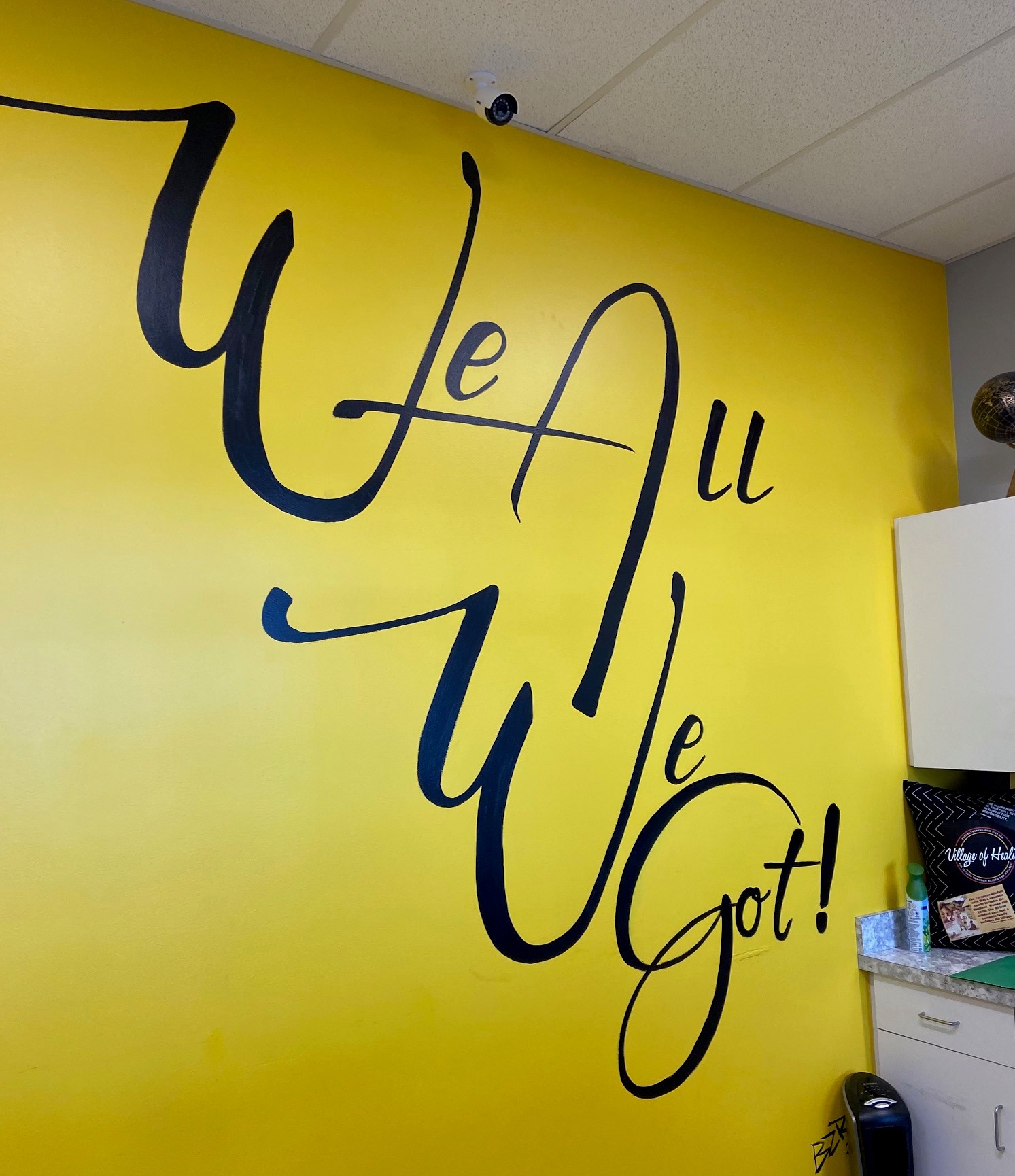
Photo Credit: Qiana Williams
We were immediately greeted with food, generosity and, most vital of all, knowledge and wisdom of what Black women leadership, when fully resourced, looks like. As we moved into the meeting space, we were surrounded with powerful uplifting messages reminding us of the urgency and the call to action we all need to heed to address the evils of systemic racism.
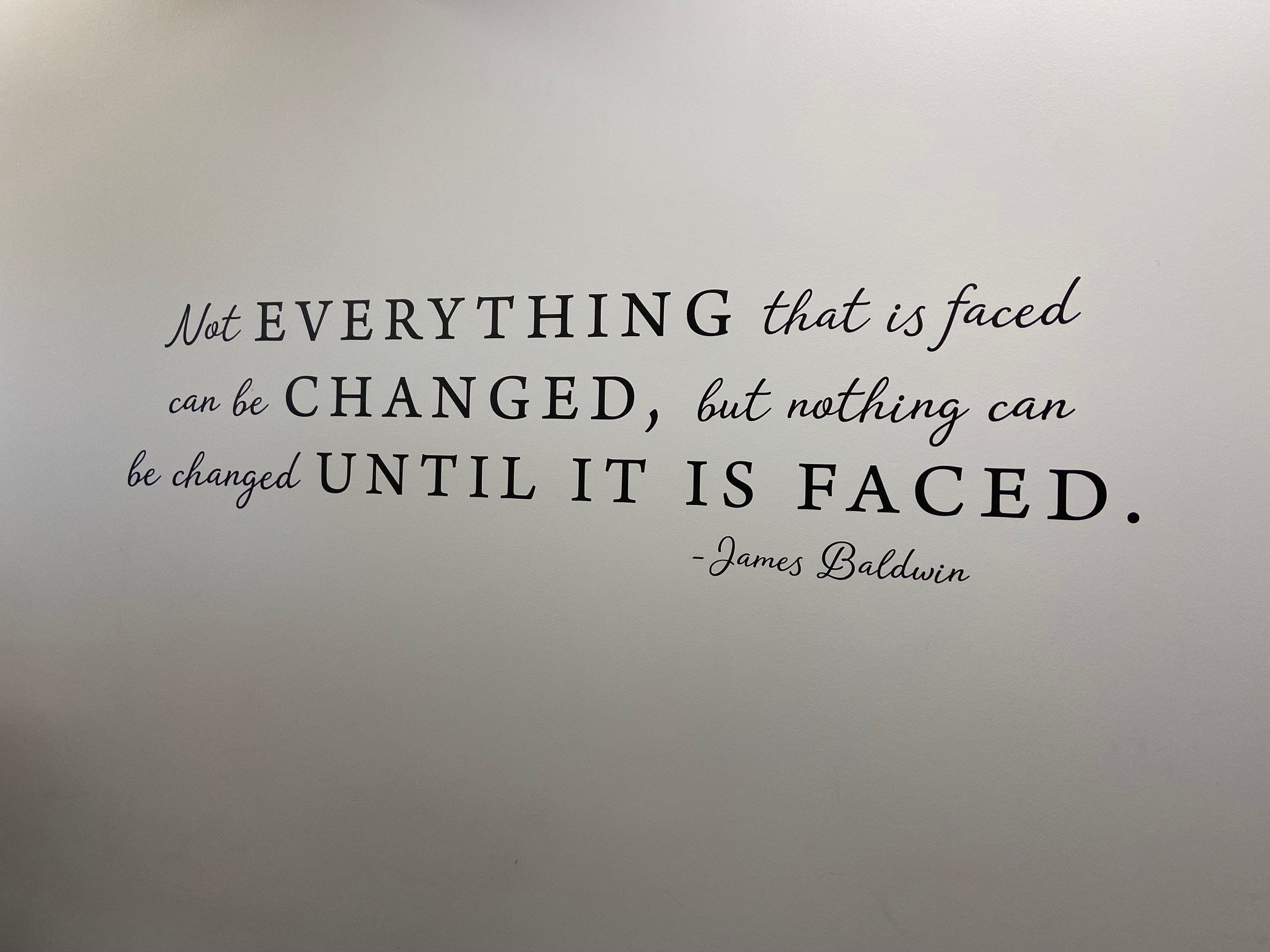
Photo Credit: Qiana Williams
The Village of Healing Center in Cleveland was born from the sheer will of several Black women trying to address the gross disparities and inequities in healthcare for Black and brown people. Launched in 2019 prior to the pandemic, the Village of Healing Center began building high-quality healthcare services and community programs with Black healthcare professionals. They offer programs that not only address health, but also take a holistic approach to healing. Programs such as Mother to Mother and Sister Circle focus on community building. The Village of Healing Center provides services to more than 700 Black and brown women.
Like all inventive Black women leaders, this vital work is done in partnership with others, such as Birthing Beautiful Communities — a community-based organization (CBO) led by Black woman that has served more than 600 clients and trained more than 75 women as perinatal support professionals, combating the social determinants that lead to poor birth outcomes. To strengthen support for this work and to bring awareness to the disproportionately high rates of mortality for Black women, both of these CBOs work in tandem with Enlightened Solutions — a nonprofit think tank led by two women (one who is Black and one who is white) that uses data to strategically address inequity and systemic injustice.
“Those who live in the attic know where the roof leaks.”
- Ibo proverb
As this intersectional, passionate panel shared their story of how they came together to do this powerful work, it was evident that if we funders want to be changemakers and power brokers for equity, then the most important thing we can ask is “What does the community need and how do I heed?”
To “center the margins” as Patricia Hill Collins challenges us to do in systems of oppression, we must listen to those closest to the issues as therein lies the solutions. These women leaders felt that it was more important to fight their own battle rather than asking for allies. Having walked that long, lonely road to allyship, they knew all too well that the best way to create the change that was needed was to lean on each other. They knew no one would understand better than them how to solve these critical issues. As their work radiated out, it attracted funders and donors who understood its urgency and made the investment. But, the good work is never done and true allyship for community-based organizations like these means building trust-based relationships. It means making it so that they don’t have to go it alone. It means making the investment of time, talent and dollars. The work of organizations like these may be in jeopardy as we recently learned of the court of appeals ruling in the Fearless Fund case.
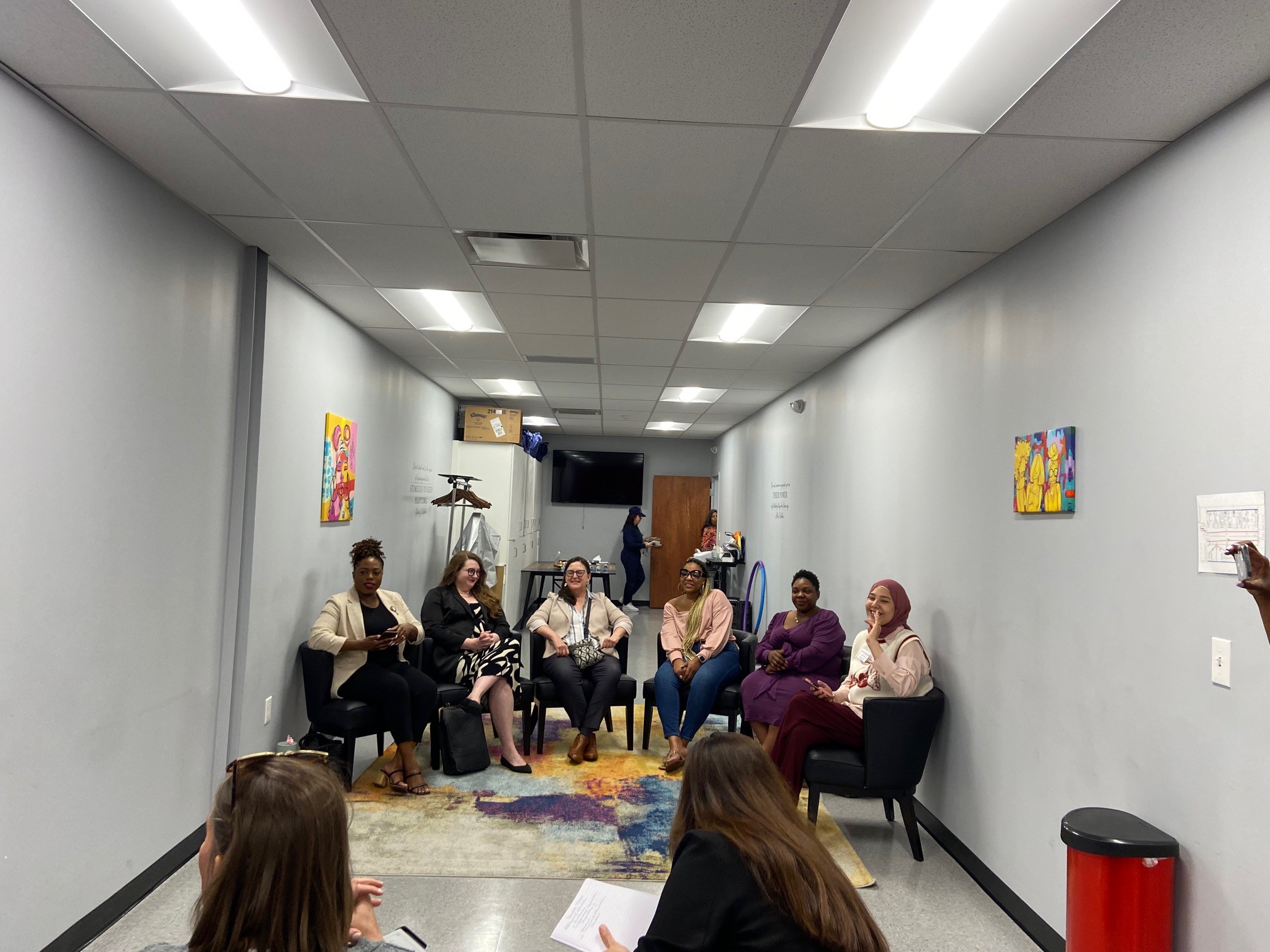
Panel at Village of Healing Center. From left to right: Chinenye Nkemere, Bethany Studenic,
Christie Manning, Da’na Langford, Jazmin Long and Talissa Lahaliyed.
Photo Credit: Qiana Williams
It impressed upon me and all of us working in philanthropy that retreat is not an option! It is never an option. That liberatory work, as the PLACES mentor Bina M. Patel passionately conveys, must continually seek to disrupt oppression. We as funders need to creatively and strategically leverage our power and privilege to ramp up the work of organizations like the Village of Healing Center if we want to see community transformation and if we are to stay true to anti-racist work.
Three poignant key takeaways that the panel shared with us were:
- Try new solutions — don’t be afraid to take risks and support impactful innovative work
- Implement emergent design and co-design — talk to those in the metaphorical attic, collaborate, “scheme and dream” to find the solutions, and get out into the community
- Provide more multi-year operational funding — the only way we can know if it’s working is to give time to sow the seeds.
Funders don’t have to practice all of the above in any particular order, but we do have a responsibility to find a way to disrupt the same systemic outcomes. We have a responsibility to power up resource leaders and communities on the margins for success and for self-determination. As they say, put our money where our mouth is!
I walked away from this day feeling deeply inspired with the hope that I will continue my commitment as a changemaker to create and support self-determination for those who have been historically disinvested. I will do this through community building and trust-based relationships.
For me, these amazing Black women leaders of the Village of Healing Center, the Birthing Beautiful Communities and Enlightened Solutions embody the creativity, life and love of the Yoruba goddess Oshun, and like Oshun they are harnessing hope for an entire generation.
About the Author
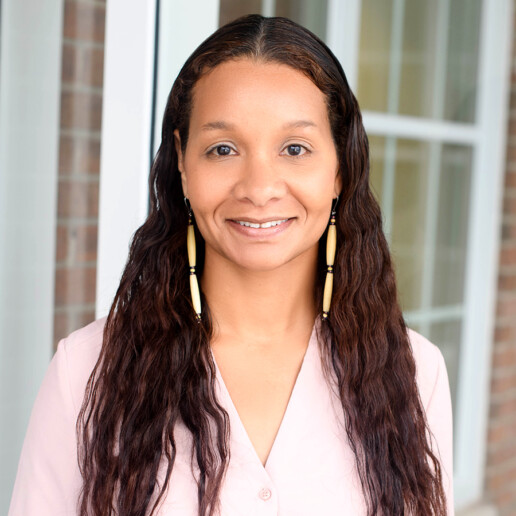 Qiana Williams is a program officer at the Central New York Community Foundation, working directly with community residents and nonprofit staff to assist in the design and implementation of the Community Foundation’s strategic initiatives and grantmaking. Qiana is a member of TFN's 2024 PLACES Fellowship cohort.
Qiana Williams is a program officer at the Central New York Community Foundation, working directly with community residents and nonprofit staff to assist in the design and implementation of the Community Foundation’s strategic initiatives and grantmaking. Qiana is a member of TFN's 2024 PLACES Fellowship cohort.


